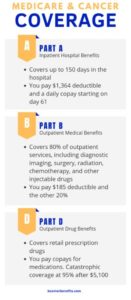How Does Medicare Cover Cancer? Part 2 of 2

By Danielle Kunkle Roberts
What are my out-of-pocket costs for cancer treatment under Medicare?
If you choose Original Medicare, you have deductibles for Part A and Part B. In 2019, the Part A deductible is $1,364, and you pay it for each benefit period. A benefit period under Part A begins the first day you are admitted to a hospital or skilled nursing facility and ends when you haven’t needed inpatient care for 60 days. In other words, you may have several benefit periods—and several Part A deductibles—in a calendar year during your cancer treatment.
The Part B deductible in 2019 is $185. You pay this just once each calendar year, and once you’ve met your deductible, you pay just 20% of the allowable charges for your outpatient care. There is no out-of-pocket maximum with Original Medicare; you pay 20% regardless of your annual cancer treatment expenses.
If you have Medicare Advantage, your deductible and coinsurance or copayment amounts are set by your plan. Usually, you have just one annual copayment instead of two for Part A and Part B. Most plans charge a copayment for outpatient services instead of a percentage coinsurance amount.
In addition, there is an out-of-pocket maximum for seniors enrolled in Medicare Advantage. In 2019, the cap is $6,700, although individual plans may set the limit below that allowed amount. Once you reach your plan’s out-of-pocket limit, you pay nothing for your cancer care or other medical expenses.
How can I get help with my cancer treatment costs with Medicare?
If you have Original Medicare, supplemental coverage with a Medigap plan pays many of your out-of-pocket costs. Medigap can’t be used with Medicare Advantage or Part D prescription drug plans, however.
You pay a separate monthly premium for Medicare Supplement Insurance Plans, and your benefits vary depending on the plan you choose. If you don’t buy a Medigap plan when you are first eligible during your Medigap Open Enrollment Period, you may not be able to buy one once you have a cancer diagnosis, however. During the Medigap OEP, you have guaranteed issue rights—you can buy a plan for the same premium as any other person in the state regardless of your health. If you wait, you’ll have to pass medical underwriting in order to buy a plan. A cancer diagnosis may disqualify you from coverage.
If you’re concerned about cancer and your Medicare coverage, consult a Medicare insurance professional to discuss your options. You may be able to find a Medicare Advantage plan or Medicare Supplement Plan to lower your out-of-pocket costs.
Post with How Does Medicare Cover Cancer Infographic

Danielle is a Medicare insurance expert who writes regularly for many online publications, including Forbes, where she is a member of the Finance Council. A TCU journalism graduate and former magazine editor, she enjoys sharing her knowledge about Medicare, retirement and insurance so that baby boomers can prepare for the costs of healthcare in retirement. She regularly appears as a guest expert on healthcare podcasts and radio shows.





